Next week, it will be National Novel Writing Month, and I will once again find myself biting my tongue. Every November, thousands of writers publicly declare their very earnest intentions to write a book in 30 days, and every November, I fill my Drafts folder with tweets mocking their daily word counts, their new sense of community, their suddenly tireless dedication to the cause.
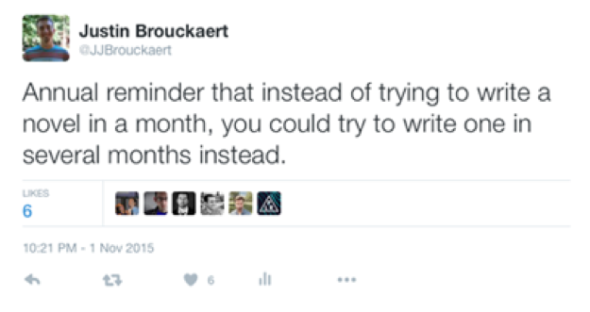
I suspect NaNoWriMo irritates me so much because my impulse to insult it is nearly matched by my impulse to join.
My natural mode has always been to write fast first drafts, to just get it down, and then spend weeks revising. When I started a novel in May 2014, I tried the same approach. Aiming for a goal of 1,000 words per day, I finished the 104,000-word first draft in only four months. My story about two friends using Detroit as training grounds for the Olympic Marathon Trials was heavy enough to be used as a blunt object when I printed all 302 pages and laid them on my desk.

“I spent more than a calendar year wading through useless, aimless prose I lopped off in bulk.” (Illustration by Josh Quick)
And yes, I even celebrated monthly word counts on social media:
- “May novel totals: 25 days, 30,047 words (85 pages). Onward to June!”
- “June novel totals: 30 days, 30,159 words (86 pages). July goal: finish this beast.”
- “July totals: 30 days, 28,512 words (86 pages). August goal: survive.”
I do understand the social aspect of NaNoWriMo, the desire to be praised and encouraged by a community of writers who understand the work of a novelist can be frustrating, exhausting and largely thankless.
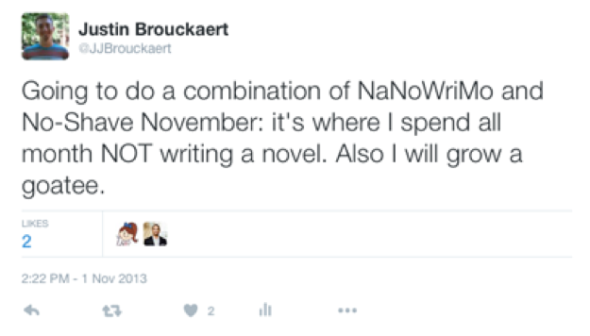
If given the chance, though, I would have done things much differently. That first draft was a mess I’ve spent more than two years exploding, filling and, finally, starting to polish. My self-imposed daily word count produced tens of pages of filler, and not the good kind, the first-draft fat that helps us heavy revisers apply better fitting flesh to the bones in future iterations. No, I spent more than a calendar year wading through useless, aimless prose I lopped off in bulk: awful metaphors for muscled quadriceps and calves; a 10,000-word race scene composed mostly of stream-of-consciousness observations of scenery; a three-page conversation about how many stairs each character thought he’d climbed in his life.
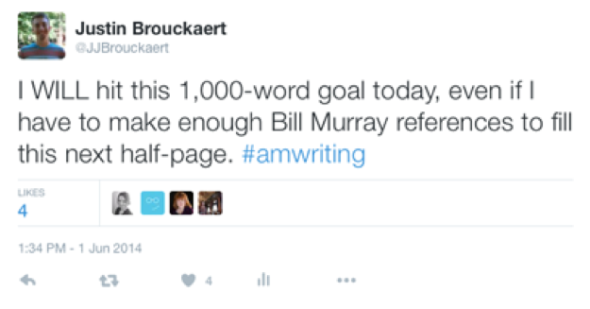
It was a harsh discovery to find I hadn’t written the first draft of a novel, but the loose and foolish outline of an ambitious book with hollow characters, an inconsistent point of view and no style to speak of. I’d written a set of unkind instructions for the hard work to come.
One of the reasons for that first-draft hurry comes from my own fear of wasting time. Stories of shelved novels abound in literary circles, but the thought of wasting months–years, even–on a draft that never leaves my desktop was–and still is–terrifying to me.
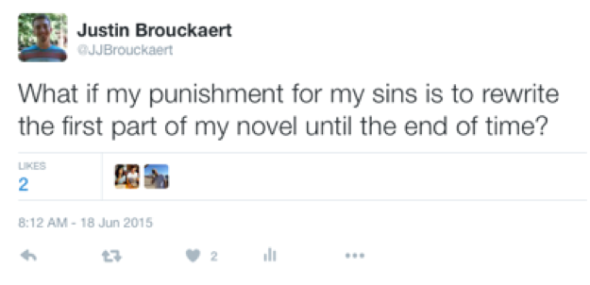
But I also think the pressures and constraints of my MFA program might have had something to do with it. I started my book the day after I finished the first year of my three-year program. It was a good time to start a novel, a professor wisely told me. I had two years to write it and revise it into a polished thesis, or else I had two years to scrap it and put together a collection instead. And I had the summer: while some writers were plugging through Camp NaNoWriMo, a “virtual retreat” in July, I too was just getting it down, working toward a word count like the rest of them.
Those pressures and constraints were mostly wonderful. I wrote and submitted like a madman during those three years: serious essays about running; surrealist prose poems about moons and skin and heartsick wanderlust; stories about aliens and guava peddlers and Rasheed Wallace. I owe much of my productivity to the structure my graduate program provided. But the fact remains: at the end of those three years, I needed something to submit to my thesis committee. I started my novel with the expectation that it would be my thesis. It had better be, I thought, the March 2016 deadline always in the back of my mind.
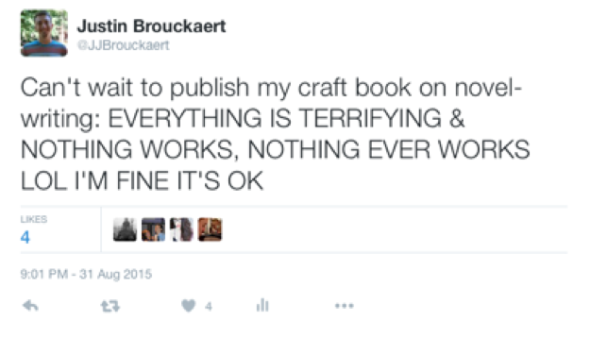
There’s a reason I try to hold my tweets, to limit the shots I take at NaNoWriMo participants. I’m no expert writer or teacher; I have no right to advise. Each of our creative processes feels unconventional and unique, because it is. But for many writers, serious or fledgling, trying to write so much so quickly is a stunting mistake. NaNoWriMo can be as dangerous as it is enticing, the potential for failure and frustration more likely than the chances of walking into December with your magnum opus under your arm.
I was once a morning writer; now I work a day job. At night, I shake the weight of the day from my shoulders and close the door to my home office to nip and tuck and deepen the novel that’s so close to becoming the book I want it to be. I keep columns of color-coded sticky notes on my wall: loose ends to be tied, thematic tones to be struck or avoided. I could write, or I could not write. I have no deadlines but my own, and I work slowly: each chapter, each paragraph, each sentence requires more attention as it nears completion, more time to do the good, hard work I’ve made for myself.
Note: The opinions expressed by guest bloggers at the Submittable blog are theirs alone and do not necessarily reflect the opinions of Submittable.
 Justin Bouckaert’s work has appeared or is forthcoming in The Rumpus, Catapult, Smokelong Quarterly and Bat City Review, among other publications. He lives and writes in Columbia, SC.
Justin Bouckaert’s work has appeared or is forthcoming in The Rumpus, Catapult, Smokelong Quarterly and Bat City Review, among other publications. He lives and writes in Columbia, SC.
